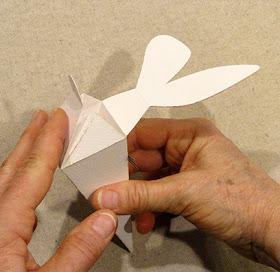Whimsical combination of carrot shape box
that
represents a bunny with loppy ears
stands upright in a specially designed
stand.
(Our adorable bunny is named "Helle" after
the imaginative originator of this design.)
(Our adorable bunny is named "Helle" after
the imaginative originator of this design.)
Box doubles as treat container or as Easter display,
with top front layered
ears "flap", side and back flaps
that fold together as closure, temp
taped or glue dot closed,
tied with decorative ribbon.
Nose, whiskers, layered
eyes give character.
Stand with insert includes cut openings
to hold
bunny upright.
Shaped picket sections attach around box sides.
Ensemble
measures approx. 3.5" x 3.5" x 7.5" tall.
ASSEMBLY: 1. Identify and cut the shapes:
A body front and side
B body back and side
C inner contrast ear shape
D front ear shape (with cutouts)
E facial accents: nose/whiskers, nose, eyes
F box platform main shape
G front and back fence accents
H side fence accents (2)
I optional cross beam overlays (12)
J box bottom insert
portion of body front ears taking care
to line up edges that match.
If the bunny will be used for decor only,
the tabs can be carefully lined up and glued
in position. To be used as a container,
fill first, then use temp adhesive dots
or similar method to keep panels in
closed position.
over corresponding areas of front, back and
side fence units, and glue in place.
in similar manner, also attaching side tabs of
front/back units to backsides as side units
are positioned and attached.
A body front and side
B body back and side
C inner contrast ear shape
D front ear shape (with cutouts)
E facial accents: nose/whiskers, nose, eyes
F box platform main shape
G front and back fence accents
H side fence accents (2)
I optional cross beam overlays (12)
J box bottom insert
2. Prepare the face shapes:
layer nose onto whiskers/nose base shape
layer eyes (if body shapes will not show thru
as "white" or other desired color)
3. Prepare the two body shapes by bending
back on the "vertical" panel and side flange tab
lines, horizontal lines above main pointed panel,
forward at ears and top back panel tab,
back on other tab lines.
4. Position and join the body side seam by
overlapping the straight edge of the back/side
body edge over opposite flange tab,
adjusting to make sure points line up, and
top horizontal perf lines, etc.
5. Layer and attach the ears front shape over
the contrast inner ear layer, taking care
to align all outer edges.
6. Attach ears overlay unit over correspondingportion of body front ears taking care
to line up edges that match.
7. Determine positioning for face, then position
and attach nose/whiskers unit, centered,
then eye units above.
8. Prepare to close the box top by bending
side panels and tabs inward . . .
. . . back panel and tabs forward . . .
. . . then bend front panel back to meet up.If the bunny will be used for decor only,
the tabs can be carefully lined up and glued
in position. To be used as a container,
fill first, then use temp adhesive dots
or similar method to keep panels in
closed position.
9. If desired, tie a length of soft ribbon
around the ears/tabs at narrowest width
into knot and bow.
10. Prepare the platform by bending back
on all side panel and tab perforation lines.
Also push the center triangle tabs back
at opening.
11. Form the shape into its tray finished form
by bending back adjacent sides to
overlap straight edge over corresponding
side tab, and glue in place.
Repeat for remaining 3 corner seams.
12. Prepare the front and back fence overlay
shapes by bending back side tabs.
13. If desired, position cross beam overlaysover corresponding areas of front, back and
side fence units, and glue in place.
14. Position the front fence unit over
the front panel of platform, align side edges,
bottom edges, and glue touching surfaces
together. Repeat for back unit.
15. Position the two side units onto platform side panelsin similar manner, also attaching side tabs of
front/back units to backsides as side units
are positioned and attached.
16. Prepare the bottom insert by bending
side flanges forward, apply glue to
outer flange surfaces, then . . .
. . . position under platform and fit into
the bottom opening (this is a tight fit) . . .
. . . and ease upward into position where
flange bottom edges are even with
platform bottom edges.
17. To complete the display, insert bunny tip
through platform top opening and
straight down so that tip also inserts
into the cutout in the insert underneath.
Here is the completed bunny carrot box.























Awwww.....I feel so honored <3 Thank you Jodi <3
ReplyDelete